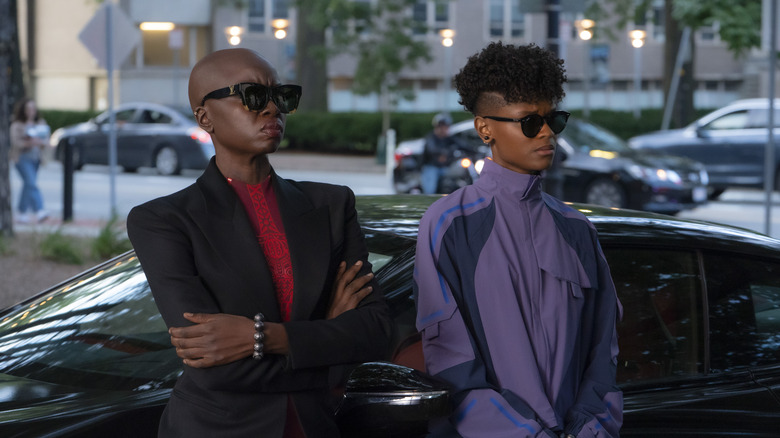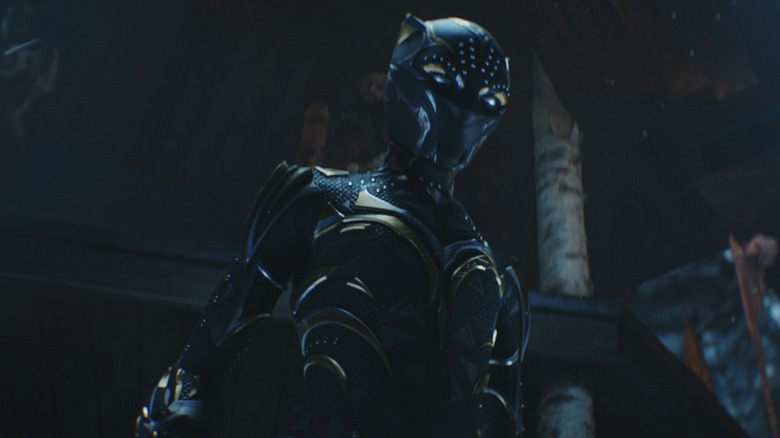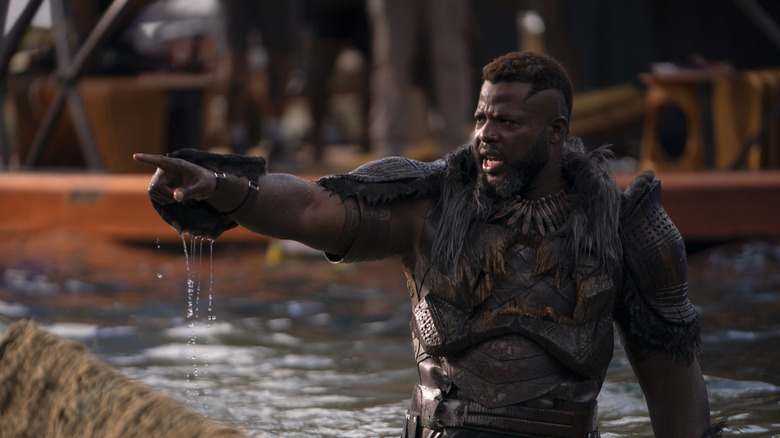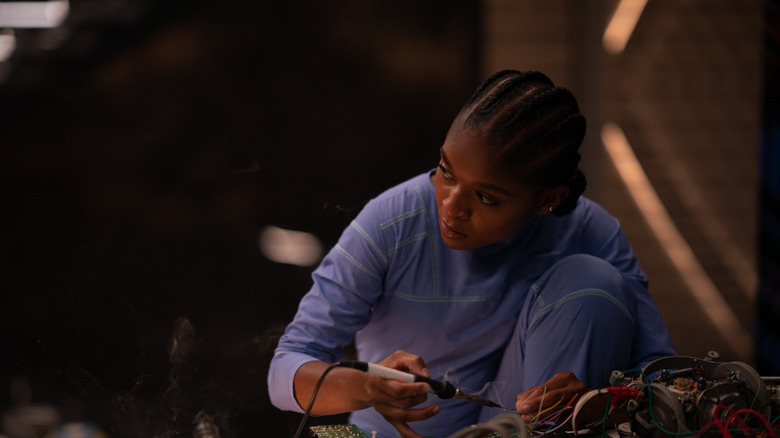Black Panther: Wakanda Forever Spoiler Review: An MCU Entry That Works When It Focuses On Real-Life Tragedy
It is impossible to think or talk about "Black Panther: Wakanda Forever" without also thinking or talking about the tragic death of Chadwick Boseman, who brought to life one of the most charismatic heroes in the Marvel Cinematic Universe. For all the various ways in which people fan-cast and theorize about what future comic-book movies will look like, what stories they'll tell, and what action will be brought to life, there has really only been one question to ask about "Wakanda Forever": how would it handle Boseman's death? The good news is that the most powerful and emotionally effective moments of this new MCU entry are those centered around the consequences of Boseman's passing. The bad news is how shakily the more predictable aspects of the film – those that have nothing to do with real-life tragedy – are incorporated.
Partially, having Boseman's death on your mind as you watch "Wakanda Forever" is by design: the film opens with the unexpected, heartbreaking, and offscreen death of King T'Challa of Wakanda, as his sister Shuri desperately tries to recreate the heart-shaped herb that once empowered him to be the Black Panther, to no avail. This scene is arresting and powerful, as is the entire pre-logo sequence, in which T'Challa is given a proper royal burial. (Though the Marvel studio logo is always a bit too long for its own good, the silent version here accompanied by a montage of Boseman's work is very effective.)
The problem is not how Ryan Coogler (returning as director, as well as co-writing the film with Joe Robert Cole) grapples with tragedy. The problem is that every part of "Wakanda Forever" that's about setting up Phase Five of the MCU falls woefully short. The parts of this movie trying to reckon with T'Challa's death work powerfully, because you can see the true pain on the faces of actors like Letitia Wright and Angela Bassett. For a larger franchise that featured a memorable, jaw-dropping moment in which a villain removed half of humanity from existence, here is a death that cannot be undone. We can't know the hearts of these actors, or Coogler, but the gravity afforded to the loss of T'Challa feels very much like a true breaking of the fourth wall. We all know exactly why the heartbreak registers so deeply.
Seeing behind-the-scenes seams
But once the film has to move forward, jumping ahead a year after T'Challa's death, the gears start turning in creaky fashion. The key ramification of T'Challa having revealed the true nature of his nation at the end of the first "Black Panther" is that the nations of the world (selfishly, if in cynically reasonable fashion) want their hands on vibranium and are prepared to do anything to get it. For some nations, like the French, it means unleashing mercenaries on Wakandan outreach centers (a plan quickly foiled by the Dora Milaje). For some nations, like the United States, it means drilling deep beneath the surface of the ocean. That plan initially works, as a team of scientists find traces of vibranium far from Wakanda's surface. Yet in doing so, they've inadvertently roused the murderous attention of the Talokan civilization of people who dwell far underwater, led by Namor (Tenoch Huerta Mejia), a charismatic mutant who's got a few hundred years of life on characters like Shuri, her mother Queen Ramonda (Bassett), and everyone else in the film.
It is in the storyline tying Shuri and Namor together that you can't help but wonder if we're seeing the seams of a script originally meant to be anchored on T'Challa instead of his little sister. After the initial shock of being visited by a water-dwelling mutant, Shuri and Okoye (Danai Gurira) head to the States to find out who built the strange device that enabled the aforementioned and now dead American scientists to detect vibranium underwater. That leads our heroic duo to a 19-year-old MIT student, Riri Williams (Dominique Thorne), who's not only built said machine but basically built her own Iron Man suit in an otherwise abandoned mechanic's garage. (Though Thorne is fine here, the way her character's scientific capabilities — which far surpass those of ... basically anyone else alive — are introduced but not clarified is kind of baffling.)
Just as the Americans want their hands on vibranium, they also want their hands on whoever killed the scientists and assume it must be Wakandans. That bloodlust is personified poorly through government boss Valentina Allegra de Fontaine (Julia Louis-Dreyfus, reprising her role from "The Falcon and the Winter Soldier"), who also happens to be the ex-wife of Everett Ross (Martin Freeman). Nothing against Freeman or Louis-Dreyfus, but if there's anything from this 161-minute movie that could have been removed, it's this subplot. Aside from an extended nighttime chase near MIT, there's little added by the presence of these actors or of the Americans at all. (Though TV nerds may find a weird sense of enjoyment and distraction in one scene in which Tim from the British "Office", Elaine Benes from "Seinfeld", and Toby from "The West Wing" all argue about the implications of Wakanda and its vibranium capabilities.)
Burn the world
The Americans are a sideshow to the real story, as Shuri gets to learn the key facts regarding Namor's identity, why the Talokans are underwater, and why they very badly want to proactively attack the surface world. Initially, Shuri and Namor are able to share a mutual respect (slightly bordering on flirtation): Shuri gets a better sense of the oppression Namor has felt over his hundreds of years of life, while Namor grasps that Shuri feels some of that oppression herself and is wary of the rest of the surface world being aware of Wakanda's powers. But that respect crumbles quickly, as Namor fails to enlist Shuri and the Wakandans in that pre-emptive strike against the surface world. Namor's response — which is as disproportionate as his entire desire to destroy the entire world — is to kill Queen Ramonda herself, sending Shuri down a vengeance spiral.
Imagine what that story would have felt like had T'Challa been at the forefront. Typically, you try not to think about the what-ifs, because there's only what is on the screen in front of you. But even if "Wakanda Forever" didn't spend much of its opening and closing sections dealing with the ramifications of Boseman's death (as well it should, please note), it would be impossible to not think about the lost possibilities. "Wakanda Forever" may not have worked quite as well anyway, but so much of what Shuri goes through as it relates to Namor and the characters' potential similarities feels like a story for T'Challa grafted shakily onto his Q-like little sister. Shuri's vengeance and guilt feel like unnatural responses based on what we've seen the character display. Shuri's grief is powerful, especially in the final moments when she truly allows herself to feel the loss of her big brother. But the way that grief morphs into something darker is a misstep.
So much of the storyline with Namor – the story that's meant to be the real thrust of this movie – is unable to get off the ground. Shuri's grief curdling into vengeance against the real world is hard to buy, as when she says she wants to "burn the world". Though Wakanda's wariness of the outside world is understandable (both within the strictures of this film, and as a corollary to Black people being more than justifiably skeptical of White people), Shuri's personality shift never feels remotely believable. Vengeance against her mother's killer makes sense – and as charming as Huerta Mejia is, he is unable to make Namor as complex a character as Killmonger was in the previous film, because the script's vastly less nuanced.
Not so different
Mentioning Killmonger brings to mind another scene in "Wakanda Forever" that no doubt would have resonated with T'Challa still being alive. Though the marketing has tried to play coy about who would don the mantle of the Black Panther in the new film, the answer is Shuri herself (who's already more than capable at scientific wizardry). Throughout the film, she struggles with recreating the heart-shaped herb after Killmonger (Michael B. Jordan) destroyed it in the 2018 adventure. But by the end, Shuri creates a synthetic version that she's able to eat to be sent to the ancestral plane. But where T'Challa did so and encountered his father, Shuri is sent to the royal council instead, where she's greeted not by her father or mother, or even T'Challa ... but Killmonger himself.
He argues that Shuri is secretly driven by bloodlust and that revenge, and that should work as a scene. It should have an impact ... and it might, had T'Challa been the one receiving the "We're not so different, you and I" cliche instead of a character who barely interacted with Killmonger and who would have no real reason to encounter him in the afterlife. (That we get two versions of that cliche, from Killmonger and Namor, doesn't help.) Wright struggles with this scene (as she struggles with the darker turn Shuri is meant to take). There's only so much depth to Shuri, and only so much material to expand that depth. And the fact remains that there are a number of other characters who could've donned the Black Panther mantle, such as Okoye (Danai Gurira) or Nakia (Lupita Nyong'o). Had either of them done so, grappling with their own feelings of guilt, it might have been more impactful because of their larger roles in the first "Black Panther".
One major strength that "Black Panther" had, and one that "Black Panther: Wakanda Forever" somewhat tries to replicate is that greater knowledge of the Marvel Cinematic Universe was not required for enjoyment. "Wakanda Forever" invokes the Hulk at one point, but it only sometimes pulls at threads, or introduces them, that loom larger in the MCU. (That speaks to one reason why Louis-Dreyfus' performance is one of the low points. It's not just that she's frankly too well-known from one of the most ubiquitous TV shows of all time. It's that she's only ever appeared in the rough and leaden "Falcon and the Winter Soldier" show from last year, and remembering that show is enough to make you groan.) Though this film represents the near-conclusion of Phase Four of the MCU, it feels more like a launchpad for Shuri, for Namor, and for Riri in her Ironheart garb.
"Black Panther" worked as a standalone, but "Wakanda Forever" works only when it tries to break free of the requirements laid upon it as an MCU entry. And even then, it struggles. For some of us, there's a low bar within MCU entries these days. Consider that "Wakanda Forever" has just a mid-credits scene, and one that's meant to be more emotionally weighty than a tease for the future, as we learn that Nakia – who never attended T'Challa's funeral – did so at his request, to protect herself and their five-year-old son, named after his dad, as they make a new life in Haiti. The low bar here is that there's no surprise cameo, no tease of a big-name hero, and nothing that hints at the next Big Bad. What we're left with is a movie whose makers are wracked with grief, grief that countless people across the world share, but grief that cannot turn itself into a cathartically entertaining experience. "Wakanda Forever" had unfair expectations placed upon it, and that it does not achieve them is unsurprising. But it's still disappointing.



